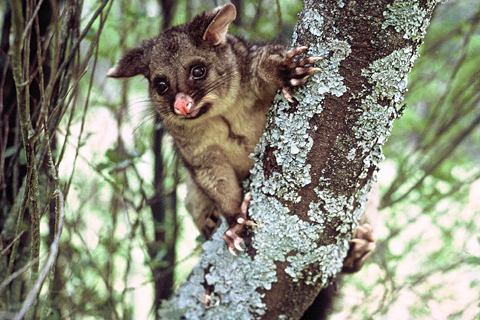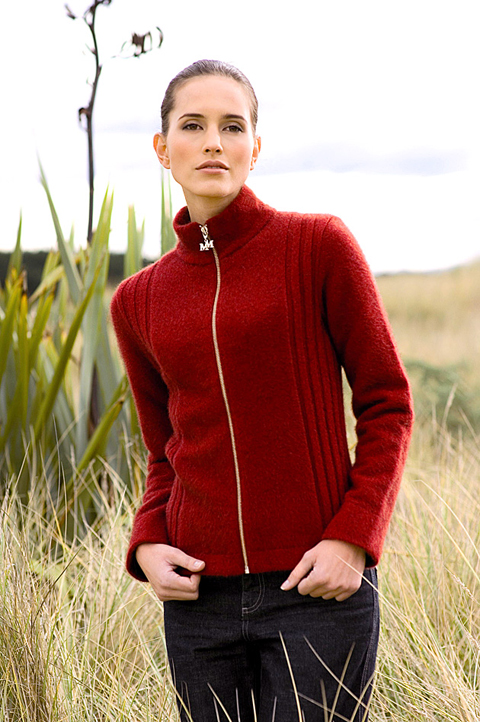The Australian brushtailed possum is an ecological disaster in New Zealand, but these days it can be found in Washington and Hollywood as well.
Millions of dollars are spent every year trying to control the millions of cute but destructive possums found throughout the country, and the rapid growth of a commercial industry to exploit its fur is making a difference.
Former US president Bill Clinton and his wife Hillary — the incoming Secretary of State — are among those who own clothing made from possum fur blended with merino wool.

PHOTO: AFP
Peri Drysdale is the founder of New Zealand fashion label Untouched World, which has an emphasis on environmentally sustainable products and has won fans in the Clintons and Hollywood luminaries including “Desperate Housewives” star Felicity Huffman and Sharon Stone.
Drysdale is one of the pioneers of blending possum fur with merino, knitting her first garment from the blend in 1992 and first selling it commercially in 1996.
“The thing we really like about it is it creates a light, luxurious, beautifully soft garment and, unusually for a very fine textile, it has very good long wearing qualities,” Drysdale said.

PHOTO: AFP
Possum fibers are hollow and fine, providing great warmth despite their light weight, and they don’t tangle and create fiber balls like wool.
“We’re passionate about it because it’s such a good product,” she said.
The product is unique and Drysdale’s Snowy Peak and Untouched World companies are among a rising number of New Zealand firms making products under names such as merinomink, eco-possum, possumdown, eco fur and possum wool.
Sales of merino-and-possum-blend knitwear and accessories such as socks, scarves and gloves have grown rapidly and account for about 95 percent of all commercially caught possum fur.
The rest in the form of possum pelts is used for fur trims, jackets, bed throws, possum leather gloves and even novelty items such as fur nipple warmers and g-strings.
Demand has risen sharply worldwide in recent years despite the campaign by animal rights groups such as PETA (People for the Ethical Treatment of Animals) against wearing fur.
Industry figures say most criticism over possum dissipates when critics become aware of the facts about the environmental damage done by possums in New Zealand.
Brushtailed possums were first introduced to New Zealand in 1837 from their native Australia in hopes of starting a fur industry, and their numbers have exploded in the absence of predators.
“They destroy the trees, they eat birds, they eat eggs and they compete directly with many native species for resources,” Department of Conservation senior advisor Herb Christophers said.
Numbers of many native New Zealand birds — including the iconic flightless kiwi — are falling fast and they could be doomed to extinction in the wild unless possums and other pests including rats and ermines are brought under control.
Possums also spread bovine tuberculosis, threatening New Zealand’s beef, dairy and venison exports.
Animal health and conservation authorities spend many millions of dollars each year on trapping and poisoning campaigns in attempts to control the pest.
Controversially this includes dropping the sodium fluoroacetate poison, known as 1080, from the air over large tracts of forest, with deer and a small numbers of birds also falling victim to poisoning.
Many in the commercial possum industry want the poisoning to be reduced or stopped and for government authorities to work more closely with the commercial industry.
“The issue is whether the commercial industry can play a major role in meeting the animal health and biodiversity goals, and if it can then we should be giving it all the support we can give,” said Steve Boot, owner of Basically Bush.
Basically Bush is a trading company responsible for buying more than half the possum fur caught by hunters for commercial use in New Zealand.
Boot estimates that around 1.8 million possums have been harvested in the wild by the commercial industry over the last year.
“If we could grow it to 3 million possums harvested and keep that up for five to 10 years, it would be very difficult to find animals in some areas,” he said.
But Christophers said commercial harvesting could never replace the trapping and poisoning possum control program run by the government.
“Some people think it’s a substitute for possum management; it’s certainly a good supplement but it’s not a substitute,” he said.
“Show me the people who are going to go out there and do all this work. It’s hard work and it’s not everybody’s cup of tea,” he said. “If we stop using 1080 we will lose species, it’s as simple as that.”
But he said conservation authorities were happy to work with the fur industry and don’t want any conflict.
Boot says most in the possum business would be happy if their hunting was so successful that it killed off their industry.
“By and large the industry feels that if it ever got to the point in 15 to 20 years time that there weren’t enough possums left to support it then we should all be able to hold our heads up and say well done,” he said.

EUROPEAN TARGETS: The planned Munich center would support TSMC’s European customers to design high-performance, energy-efficient chips, an executive said Taiwan Semiconductor Manufacturing Co (TSMC, 台積電), the world’s largest contract chipmaker, yesterday said that it plans to launch a new research-and-development (R&D) center in Munich, Germany, next quarter to assist customers with chip design. TSMC Europe president Paul de Bot made the announcement during a technology symposium in Amsterdam on Tuesday, the chipmaker said. The new Munich center would be the firm’s first chip designing center in Europe, it said. The chipmaker has set up a major R&D center at its base of operations in Hsinchu and plans to create a new one in the US to provide services for major US customers,

The Ministry of Transportation and Communications yesterday said that it would redesign the written portion of the driver’s license exam to make it more rigorous. “We hope that the exam can assess drivers’ understanding of traffic rules, particularly those who take the driver’s license test for the first time. In the past, drivers only needed to cram a book of test questions to pass the written exam,” Minister of Transportation and Communications Chen Shih-kai (陳世凱) told a news conference at the Taoyuan Motor Vehicle Office. “In the future, they would not be able to pass the test unless they study traffic regulations

‘A SURVIVAL QUESTION’: US officials have been urging the opposition KMT and TPP not to block defense spending, especially the special defense budget, an official said The US plans to ramp up weapons sales to Taiwan to a level exceeding US President Donald Trump’s first term as part of an effort to deter China as it intensifies military pressure on the nation, two US officials said on condition of anonymity. If US arms sales do accelerate, it could ease worries about the extent of Trump’s commitment to Taiwan. It would also add new friction to the tense US-China relationship. The officials said they expect US approvals for weapons sales to Taiwan over the next four years to surpass those in Trump’s first term, with one of them saying

‘COMING MENACINGLY’: The CDC advised wearing a mask when visiting hospitals or long-term care centers, on public transportation and in crowded indoor venues Hospital visits for COVID-19 last week increased by 113 percent to 41,402, the Centers for Disease Control (CDC) said yesterday, as it encouraged people to wear a mask in three public settings to prevent infection. CDC Epidemic Intelligence Center Deputy Director Lee Chia-lin (李佳琳) said weekly hospital visits for COVID-19 have been increasing for seven consecutive weeks, and 102 severe COVID-19 cases and 19 deaths were confirmed last week, both the highest weekly numbers this year. CDC physician Lee Tsung-han (李宗翰) said the youngest person hospitalized due to the disease this year was reported last week, a one-month-old baby, who does not